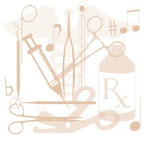Wednesday, December 09, 2009
Pediatric Anesthesia: New Research Results
Very interesting study done using music with pediatric surgery patients.
School-aged children's experiences of postoperative music medicine on pain, distress, and anxiety
STEFAN NILSSON RN, MSC*†, EVA KOKINSKY MD, PhD*, ULRICA NILSSON RNA, PhD‡, BIRGITTA SIDENVALL RN, PhD† AND KARIN ENSKÄR RN, PhD†
*Department of Paediatric Anaesthesia and Intensive Care Unit, The Queen Silvia Children's Hospital, Sahlgrenska University Hospital, Göteborg , †Department of Nursing Science, School of Health Sciences, Jönköping University, Jönköping and ‡Department of Anaesthesiology and Intensive Care and Centre for Health Care Sciences, Örebro University Hospital, Örebro, Sweden
Correspondence to Stefan Nilsson, Department of Paediatric Anaesthesia and Intensive Care Unit, The Queen Silvia Children's Hospital, Sahlgrenska University Hospital, 416 85 Göteborg, Sweden (email: stefan.r.nilsson@vgregion.se).
ABSTRACT
Aim: To test whether postoperative music listening reduces morphine consumption and influence pain, distress, and anxiety after day surgery and to describe the experience of postoperative music listening in school-aged children who had undergone day surgery.
Background: Music medicine has been proposed to reduce distress, anxiety, and pain. There has been no other study that evaluates effects of music medicine (MusiCure®) in children after minor surgery.
Methods: Numbers of participants who required analgesics, individual doses, objective pain scores (Face, Legs, Activity, Cry, Consolability [FLACC]), vital signs, and administration of anti-emetics were documented during postoperative recovery stay. Self-reported pain (Coloured Analogue Scale [CAS]), distress (Facial Affective Scale [FAS]), and anxiety (short State-Trait Anxiety Inventory [STAI]) were recorded before and after surgery. In conjunction with the completed intervention semi-structured qualitative interviews were conducted.
Results: Data were recorded from 80 children aged 7–16. Forty participants were randomized to music medicine and another 40 participants to a control group. We found evidence that children in the music group received less morphine in the postoperative care unit, 1/40 compared to 9/40 in the control group. Children's individual FAS scores were reduced but no other significant differences between the two groups concerning FAS, CAS, FLACC, short STAI, and vital signs were shown. Children experienced the music as 'calming and relaxing.'
Conclusions: Music medicine reduced the requirement of morphine and decreased the distress after minor surgery but did not else influence the postoperative care.
Subscribe to:
Post Comments (Atom)






No comments:
Post a Comment